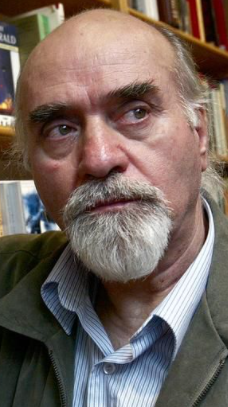May 20, 2022

Reza Baraheni, poet, dissident and former president of PEN Canada (2001-03), has died, at the age of 86, in Toronto.
He had the unique distinction, and ill fortune, of being jailed and tortured by both the regime of the Shah and, after the 1979 revolution, the Islamic Republic. He went into exile twice — in the 1970s to the United States for five years, and then in 1997 to Canada where he settled.
A human-rights activist and a ferocious defender of freedom of speech, Baraheni was perpetually protesting his homeland’s persecution of writers, intellectuals and ethnic minorities.
A prodigious author, in English and Persian, he left behind more than 60 books of essays, literary criticism, fiction and poetry. His works have been translated into a dozen languages.
Born into an Azerbaijani family in Tabriz, he grew up in grinding poverty. As a lecturer at the University of Tehran, he spoke up for non-Persian minorities whose linguistic, ethnic and cultural identities were being suppressed. He was arrested by the Shah’s police.
In an interview with Haroon Siddiqui, who wrote an obituary of Baraheni for the Toronto Star, Baraheni described his 102 days in captivity under the monarchy.
His interrogator demanded to know who put him up to writing the article that prompted his arrest. The interrogator refused to believe that Baraheni wrote it on his own initiative.
“He then started kicking me in the stomach, groin and testicles. I fell down. Others joined in the beating. I was stretched out on a torture bed, my hands and feet tied down. I was given 75 blows to the soles of my feet with a barbed-wire whip. I fainted….
“I was told if I didn’t confess, my wife and my 13-year-old daughter would be raped in front of me.”
He was released and fled to the United States.
After the 1979 revolution, Baraheni returned to Iran, trading the tranquility of his tenured professorship at the University of Maryland for the taste of promised freedom in his homeland.
He resumed teaching at the University of Tehran but was soon condemned as a counter-revolutionary and incarcerated for 84 days.
Baraheni was held in solitary confinement and blindfolded often, always during interrogations. Returning disoriented from one such night session, he found himself pushed into a long line of prisoners being marched uphill. It turned out they were all being led to a firing squad and he had been added to the group in error.
He screamed and eventually “they found the condemned man. I was spared. Minutes later, I heard the shots.”
Following his release, Baraheni was fired from the university. He fled to Sweden, from where he went to Canada.
Baraheni died March 24. He is survived by his wife, Sanaz Sehhati, of Toronto; daughter, Aleca, of Fairfax, Virginia; sons Oktay, of Tehran and Toronto; and Arsalan Esfandiar, of Toronto.
